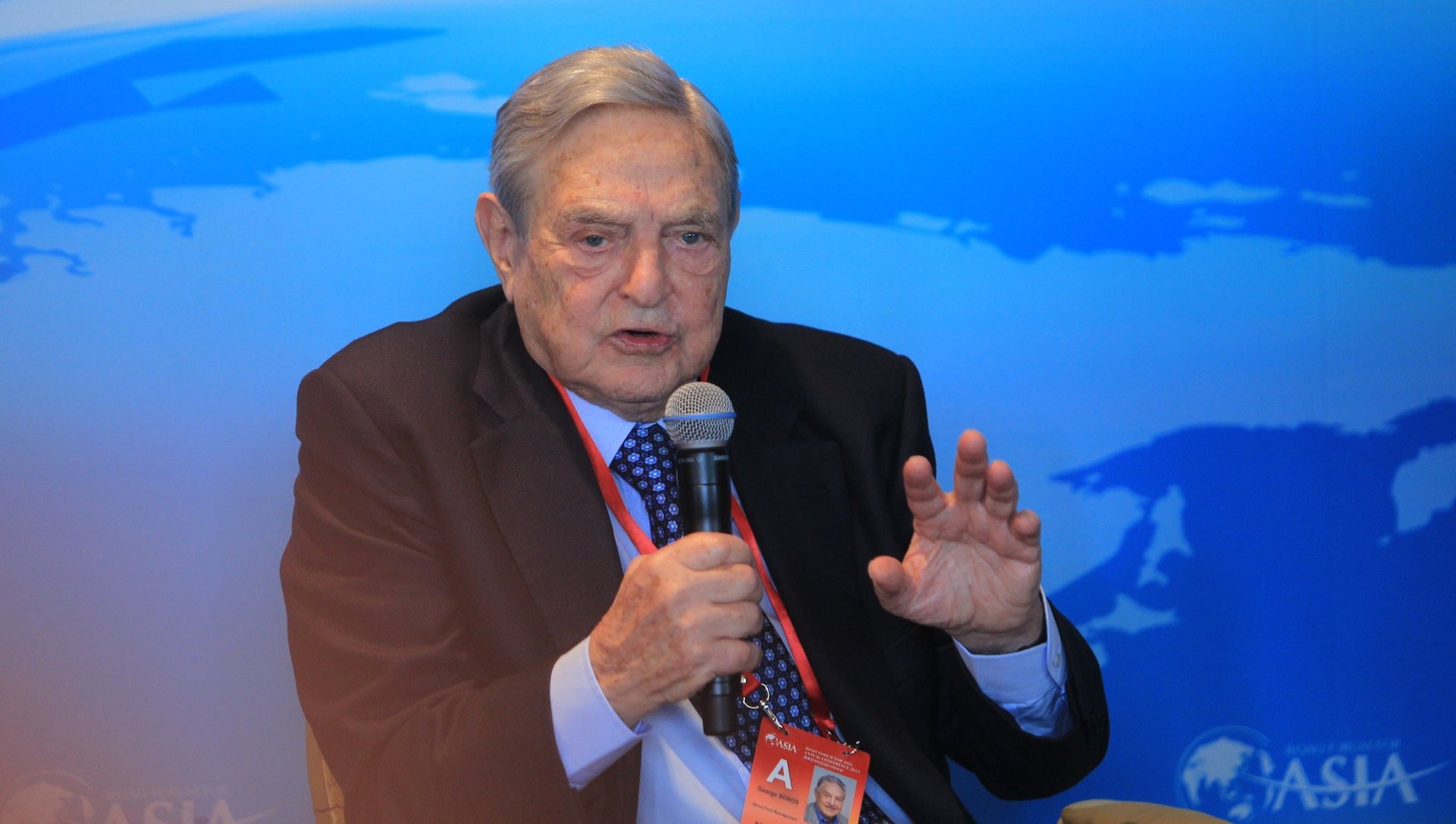At Davos, George Soros tears into Facebook and Google
Davos, Switzerland


Davos, Switzerland
Financier and philanthropist George Soros criticized Donald Trump and Vladimir Putin at his annual Davos dinner, decried the state of global democracy, and warned about the rising threat of nuclear war.
While his words were certainly chilling, Soros has sounded some of these warnings before. This year, though, he flagged a brand new threat—the unchecked power of Google and Facebook, which Soros feels now have “monolithic power” that they’re using to manipulate and deceive consumers. The net result could be totalitarian control, Soros said. Here is a transcript of his full remarks on the topic:
These companies have often played an innovative and liberating role. But as Facebook and Google have grown into ever more powerful monopolies, they have become obstacles to innovation, and they have caused a variety of problems of which we are only now beginning to become aware.
Companies earn their profits by exploiting their environment. Mining and oil companies exploit the physical environment; social media companies exploit the social environment. This is particularly nefarious because social media companies influence how people think and behave without them even being aware of it. This has far-reaching adverse consequences on the functioning of democracy, particularly on the integrity of elections.
The distinguishing feature of internet platform companies is that they are networks and they enjoy rising marginal returns; that accounts for their phenomenal growth. The network effect is truly unprecedented and transformative, but it is also unsustainable. It took Facebook eight and a half years to reach a billion users and half that time to reach the second billion. At this rate, Facebook will run out of people to convert in less than 3 years.
Facebook and Google effectively control over half of all internet advertising revenue. To maintain their dominance, they need to expand their networks and increase their share of users’ attention. Currently they do this by providing users with a convenient platform. The more time users spend on the platform, the more valuable they become to the companies.
Content providers also contribute to the profitability of social media companies because they cannot avoid using the platforms and they have to accept whatever terms they are offered.
The exceptional profitability of these companies is largely a function of their avoiding responsibility for—and avoiding paying for—the content on their platforms.
They claim they are merely distributing information. But the fact that they are near-monopoly distributors makes them public utilities and should subject them to more stringent regulations, aimed at preserving competition, innovation, and fair and open universal access.
The business model of social media companies is based on advertising. Their true customers are the advertisers. But gradually a new business model is emerging, based not only on advertising but on selling products and services directly to users. They exploit the data they control, bundle the services they offer, and use discriminatory pricing to keep for themselves more of the benefits that otherwise they would have to share with consumers. This enhances their profitability even further—but the bundling of services and discriminatory pricing undermine the efficiency of the market economy.
Social media companies deceive their users by manipulating their attention and directing it towards their own commercial purposes. They deliberately engineer addiction to the services they provide. This can be very harmful, particularly for adolescents. There is a similarity between internet platforms and gambling companies. Casinos have developed techniques to hook gamblers to the point where they gamble away all their money, even money they don’t have.
Something very harmful and maybe irreversible is happening to human attention in our digital age. Not just distraction or addiction; social media companies are inducing people to give up their autonomy. The power to shape people’s attention is increasingly concentrated in the hands of a few companies. It takes a real effort to assert and defend what John Stuart Mill called “the freedom of mind.” There is a possibility that once lost, people who grow up in the digital age will have difficulty in regaining it. This may have far-reaching political consequences. People without the freedom of mind can be easily manipulated. This danger does not loom only in the future; it already played an important role in the 2016 US presidential elections.
But there is an even more alarming prospect on the horizon. There could be an alliance between authoritarian states and these large, data-rich IT monopolies that would bring together nascent systems of corporate surveillance with an already developed system of state-sponsored surveillance. This may well result in a web of totalitarian control the likes of which not even Aldous Huxley or George Orwell could have imagined.
The countries in which such unholy marriages are likely to occur first are Russia and China. The Chinese IT companies in particular are fully equal to the American ones. They also enjoy the full support and protection of the Xi Jingping regime. The government of China is strong enough to protect its national champions, at least within its borders.
US-based IT monopolies are already tempted to compromise themselves in order to gain entrance to these vast and fast growing markets. The dictatorial leaders in these countries may be only too happy to collaborate with them since they want to improve their methods of control over their own populations and expand their power and influence in the United States and the rest of the world.
The owners of the platform giants consider themselves the masters of the universe, but in fact they are slaves to preserving their dominant position. It is only a matter of time before the global dominance of the US IT monopolies is broken. Davos is a good place to announce that their days are numbered. Regulation and taxation will be their undoing and EU Competition Commissioner Vestager will be their nemesis.